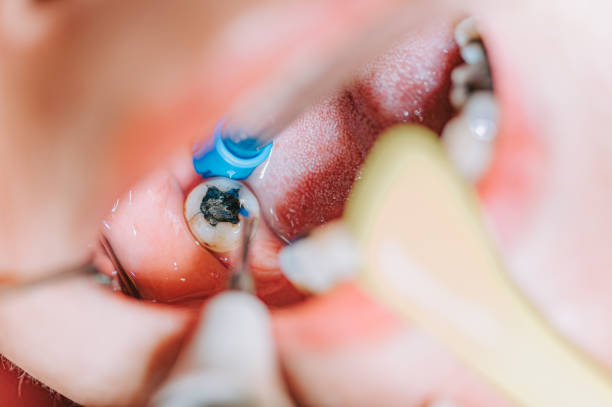A root canal is a dental treatment to save a compromised or infected tooth. Although it reduces the agony connected to the infection, discomfort may remain after the operation. Usually transient, this pain can be managed with simple actions. It is quite important to know how to take care of your teeth throughout this recuperation phase.
So, how does one manage discomfort after a root canal treatment?
There are several ways to lessen suffering and speed healing. Some tips are avoiding certain meals, maintaining proper oral hygiene, and taking over-the-counter medications. These rules help prevent problems and heal faster.
Let us review eight useful strategies to help you manage pain after a root canal treatment.
Take Prescribed Pain Medications
Your dentist could prescribe ibuprofen or acetaminophen as painkillers after a root canal procedure. These medications reduce post-operative discomfort and swelling. Regarding dosage, always heed your dentist's recommendations.
Should over-the-counter drugs prove inadequate, your dentist may advise stronger medicines. See a dentist before beginning any medication. Incorrect type or dosage could lead to negative effects.
Especially in the first several days after the operation, be sure you regularly take the medicines. As your tooth recovers, this will help you feel more at ease and stay ahead of the discomfort.

Apply a Cold Compress
One simple way to reduce swelling and decrease pain is to apply a cold compress. Stuff an ice pack or bag of frozen peas between towels. Press it gently against your cheek near the treated tooth.
Use the compress for fifteen minutes at once, wait another fifteen minutes, and then apply it once more. This treatment helps to reduce inflammation and relax the area. Try not to lie the ice exactly on your skin since it can irritate it.
A cold compress is especially helpful during the first 24 hours following your root canal. It speeds up relief and improves the action of medications.
Eat Soft Foods
Your teeth will be sensitive following a root canal, so you should eat soft foods especially. Yogurt, soup, scrambled eggs, and mashed potatoes are among the choices. These dishes won't bother your teeth.
Avoid foods with a firm, crunchy, or sticky texture—nuts, popcorn, and sweets—as these may strain your treated teeth and be unpleasant. Further, avoid eating on the side of your mouth where the procedure was done.
For at least a few days or until your dentist advises otherwise, continue eating soft foods. This will help you remain free from needless agony and enable the tooth to heal properly.
Avoid Hot and Cold Drinks
After a root canal, your tooth might be sensitive to strong temperatures. Drinking either too hot or too cold liquids may cause discomfort. Steer clear of coffee, tea, ice water, and other temperature-sensitive liquids for a few days.
Choose room-temperature or lukewarm liquids instead. Using a straw can also help reduce the contact between the liquid and the treated tooth. This slight change could make you feel more comfortable.
Maintain Oral Hygiene
It is important to keep a clean mouth after a root canal. Twice a day, gently clean your teeth with a soft-bristled toothbrush. This keeps the surrounding area free from microorganisms.
If the treated tooth is too sensitive, gently floss it. Your dentist might also suggest using an antimicrobial mouthwash. This reduces your chance of disease and preserves the freshness of your mouth.
Great oral hygiene guarantees the effectiveness of your root canal treatment and speeds up recovery. Still, be cautious not to aggravate the area.

Rest and Take It Easy
Your body has to repair gradually after a root canal. Resting lets your immune system run as it should. Avoid strenuous activities like exercise or heavy lifting for at least 24 hours following the operation.
If possible, miss one day from your job or school. This is your time to unwind and heal. Extreme effort might aggravate swelling and extend the healing process.
Rest is among the easiest yet most powerful remedies for pain management. Giving your body enough time to heal can help you feel better sooner.
Use a Saltwater Rinse
A warm salt water wash can aid with discomfort and ward against infection. Stir half a teaspoon of salt into one cup of boiling water. Gently swish the solution around your mouth for about thirty seconds, then spit it out.
This rinse helps clean the area and relaxes the gums. You should use it two to three times a day, especially after meals. Ensure the water is warm instead of hot to avoid irritating your teeth.
8. Schedule a Follow-Up Appointment
You must come back to be sure your tooth is recovering properly. Your dentist may also place a crown or permanent filling on the tooth to protect it and look for signs of additional issues or infection.
Though you might feel better, don't miss this visit. Some problems might not show symptoms immediately; hence, regular dental appointments are necessary to preserve good oral health.
During the follow-up, your dentist can address any last discomfort or concerns. This helps you fully recuperate and appreciate the root canal therapy's outcomes.
Conclusion
Good healing depends on efficient pain control after a root canal treatment. These eight ideas will reduce agony and enable faster healing. Remember to take your prescriptions, practice proper oral hygiene, and let yourself relax.
Besides that, you should also ensure that you opt for the services of an experienced dentist such as Dental Associates. Dental Associates of NJ, with offices in Bayonne and Jersey City, focuses on your oral health and comfort every step of the way. Offering personalized care and a full range of dental services, they help you achieve a healthy, confident smile.





